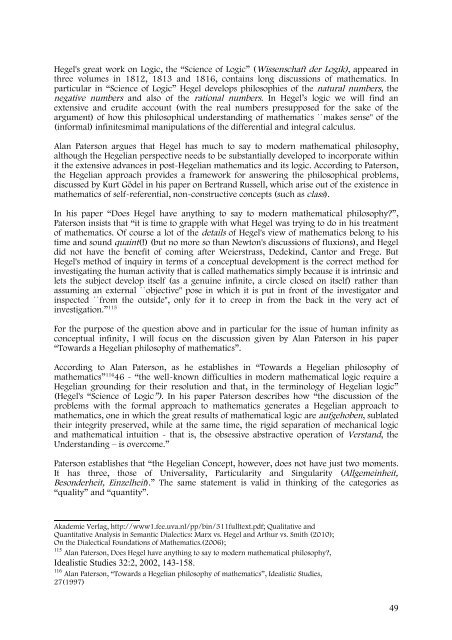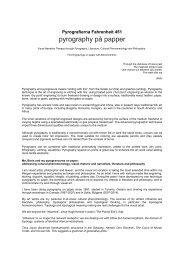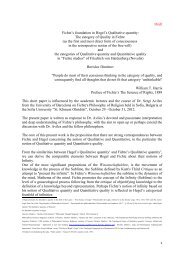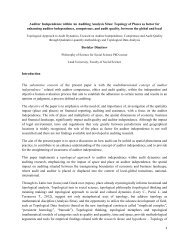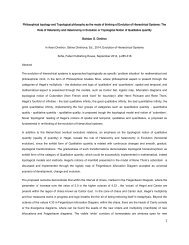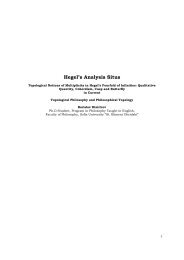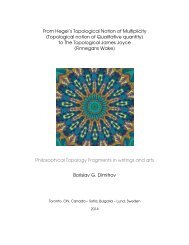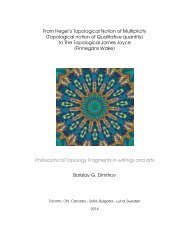Topological Ontology and Logic of Qualitative quantity
Qualitative quantity and BFO (Basic Formal Ontology) of /Barry Smith/ and YAMATO (Yet Another More Advanced Top-level Ontology) of /Riichiro Mizoguchi/
Qualitative quantity and BFO (Basic Formal Ontology) of /Barry Smith/ and YAMATO (Yet Another More Advanced Top-level Ontology) of /Riichiro Mizoguchi/
- No tags were found...
You also want an ePaper? Increase the reach of your titles
YUMPU automatically turns print PDFs into web optimized ePapers that Google loves.
Hegel's great work on <strong>Logic</strong>, the “Science <strong>of</strong> <strong>Logic</strong>” (Wissenschaft der Logik), appeared in<br />
three volumes in 1812, 1813 <strong>and</strong> 1816, contains long discussions <strong>of</strong> mathematics. In<br />
particular in “Science <strong>of</strong> <strong>Logic</strong>” Hegel develops philosophies <strong>of</strong> the natural numbers, the<br />
negative numbers <strong>and</strong> also <strong>of</strong> the rational numbers. In Hegel’s logic we will find an<br />
extensive <strong>and</strong> erudite account (with the real numbers presupposed for the sake <strong>of</strong> the<br />
argument) <strong>of</strong> how this philosophical underst<strong>and</strong>ing <strong>of</strong> mathematics ``makes sense'' <strong>of</strong> the<br />
(informal) infinitesmimal manipulations <strong>of</strong> the differential <strong>and</strong> integral calculus.<br />
Alan Paterson argues that Hegel has much to say to modern mathematical philosophy,<br />
although the Hegelian perspective needs to be substantially developed to incorporate within<br />
it the extensive advances in post-Hegelian mathematics <strong>and</strong> its logic. According to Paterson,<br />
the Hegelian approach provides a framework for answering the philosophical problems,<br />
discussed by Kurt Gödel in his paper on Bertr<strong>and</strong> Russell, which arise out <strong>of</strong> the existence in<br />
mathematics <strong>of</strong> self-referential, non-constructive concepts (such as class).<br />
In his paper “Does Hegel have anything to say to modern mathematical philosophy”,<br />
Paterson insists that “it is time to grapple with what Hegel was trying to do in his treatment<br />
<strong>of</strong> mathematics. Of course a lot <strong>of</strong> the details <strong>of</strong> Hegel's view <strong>of</strong> mathematics belong to his<br />
time <strong>and</strong> sound quaint(!) (but no more so than Newton's discussions <strong>of</strong> fluxions), <strong>and</strong> Hegel<br />
did not have the benefit <strong>of</strong> coming after Weierstrass, Dedekind, Cantor <strong>and</strong> Frege. But<br />
Hegel's method <strong>of</strong> inquiry in terms <strong>of</strong> a conceptual development is the correct method for<br />
investigating the human activity that is called mathematics simply because it is intrinsic <strong>and</strong><br />
lets the subject develop itself (as a genuine infinite, a circle closed on itself) rather than<br />
assuming an external ``objective'' pose in which it is put in front <strong>of</strong> the investigator <strong>and</strong><br />
inspected ``from the outside'', only for it to creep in from the back in the very act <strong>of</strong><br />
investigation.” 115<br />
For the purpose <strong>of</strong> the question above <strong>and</strong> in particular for the issue <strong>of</strong> human infinity as<br />
conceptual infinity, I will focus on the discussion given by Alan Paterson in his paper<br />
“Towards a Hegelian philosophy <strong>of</strong> mathematics”.<br />
According to Alan Paterson, as he establishes in “Towards a Hegelian philosophy <strong>of</strong><br />
mathematics” 116 46 - “the well-known difficulties in modern mathematical logic require a<br />
Hegelian grounding for their resolution <strong>and</strong> that, in the terminology <strong>of</strong> Hegelian logic”<br />
(Hegel's “Science <strong>of</strong> <strong>Logic</strong>”). In his paper Paterson describes how “the discussion <strong>of</strong> the<br />
problems with the formal approach to mathematics generates a Hegelian approach to<br />
mathematics, one in which the great results <strong>of</strong> mathematical logic are aufgehoben, sublated<br />
their integrity preserved, while at the same time, the rigid separation <strong>of</strong> mechanical logic<br />
<strong>and</strong> mathematical intuition - that is, the obsessive abstractive operation <strong>of</strong> Verst<strong>and</strong>, the<br />
Underst<strong>and</strong>ing – is overcome.”<br />
Paterson establishes that “the Hegelian Concept, however, does not have just two moments.<br />
It has three, those <strong>of</strong> Universality, Particularity <strong>and</strong> Singularity (Allgemeinheit,<br />
Besonderheit, Einzelheit).” The same statement is valid in thinking <strong>of</strong> the categories as<br />
“quality” <strong>and</strong> “<strong>quantity</strong>”.<br />
Akademie Verlag, http://www1.fee.uva.nl/pp/bin/311fulltext.pdf; <strong>Qualitative</strong> <strong>and</strong><br />
Quantitative Analysis in Semantic Dialectics: Marx vs. Hegel <strong>and</strong> Arthur vs. Smith (2010);<br />
On the Dialectical Foundations <strong>of</strong> Mathematics.(2006);<br />
115<br />
Alan Paterson, Does Hegel have anything to say to modern mathematical philosophy,<br />
Idealistic Studies 32:2, 2002, 143-158.<br />
116<br />
Alan Paterson, “Towards a Hegelian philosophy <strong>of</strong> mathematics”, Idealistic Studies,<br />
27(1997)<br />
49


